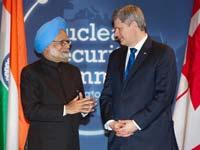India’s terror warnings angers Sikhs in Canada

Sikhs are outraged at the continuous warnings by the Indian government about the resurgence of Khalistani separatists saying such talk is tarnishing the image of community in Canada and around the world.
The latest warnings were made as India asked Canada to monitor surging activities of Sikh separatists when Indian Prime Minister Manmohan Singh met his Canadian counterpart Stephen Harper.
In his 30-minute meeting with Harper on the sidelines of the Nuclear Security Summit at Walter E. Washington Convention Centre earlier this month, Manmohan Singh conveyed his concerns over the surge in activities of Sikh separatists in Canada who are trying to revive militancy in Punjab.
“India seems to have adopted a strategy to spread false rumours about the revival of Khalistani militancy…they keep painting a picture that all Sikhs must be watched,” said Kulbir Singh, a businessman in Vancouver.
“This talk spreads terror and marginalizes our community in Canada…if they have proof catch the militants…otherwise they should just shut up and not spread rumours,” he said.
Manjeet Singh, who has lived in Surrey for the last 20 years said he is also fed up of listening to the so called warnings.
“Sure there are some who want a separate state of Khalistan but they are a small minority…the majority of the Sikhs are not militants,” he said, adding such talk will only further alienate Sikhs from New Delhi.
“It’s a shame that the prime minister, a Sikh himself, is now fanning these fires,” he said.
Several Sikh-Canadians expressed their outrage after Manmoham Singh’s comments about a Khalistani revival in Canada received wide media attention.
“Already many look at our turbans and think we are Muslim terrorists…this will not help,” said Khabar Dhillon.
The latest warnings come two months before the 25th anniversary of the bombing of Air-India flight by Sikh militants which represent the largest mass murder in modern Canadian history.
A U.S.-based anti-terror specialist said such warnings are necessary for the western world to be on their toes.
“But it does not have to be made public as it will have an adverse effect on the Sikh diaspora,” he said.
“It does not take much to be branded a terrorist these days,” he told the South Asian Post.
Vishnu Prakash, the spokesperson of India’s external affairs ministry said that Prime Minister Manmohan Singh hoped that the Canadian government will curb and monitor the activities of these organizations.
India has been watching warily a marked resurgence of pro-Khalistan elements in Canada recently and has alerted the Canadian authorities about it many a time.
Last month, India’s Minister of State for Home Affairs Ajay Maken told the Indian parliament that Sikh militant groups, especially those based abroad, continue to persist with their efforts to revive militancy in Punjab. He added that the government is maintaining a close watch on such outfits.
Outfits like the Babbar Khalsa International, International Sikh Youth Federation, Khalistan Commando Force and Khalistan Zindabad Force continue to be banned under India’s Unlawful Activities (Prevention) Amendment Act, 2004.
Recently, the Indian high commission in Ottawa raised the issue of rising activities of Sikh separatist Khalistan movement in Canada with the Candian government. Canada is one of the few countries, according to the Indian government, where pro-Khalistani elements are becoming active once again.
India also is concerned at attempts by some elements to de-list the banned organizations such as the Babbar Khalsa in Canada.
Manmohan Singh is expected to raise the issue again when he visit Canada in June for the G20 summit.
One of those whom India is extremely wary in relation to Sikh militancy is Dabinderjit Singh, a British citizen and leader of the banned International Sikh Youth Federation (ISYF).
He has sought support of Canadian political leaders and radical Sikhs for reviving the Khalistan separatist movement. The ISYF and the Babbar Khalsa are banned in Canada for promoting terrorism. The two outfits are also delisted in Britain.
During his three-week visit to Vancouver in 2008, Singh met political aides and radical Sikh leaders to promote his “Sikh Agenda”.
Singh said the agenda included the creation of Khalistan, lobbying with political leaders to get the ban on the ISYF and the Babbar Khalsa lifted, and promote Sikh interests in their adopted lands.
He said he had been lobbying with politicians in Britain to promote his seven-point agenda since 2001 when the ISYF was banned there.
Singh serves as an advisor to the Sikh Federation (UK) whose 2008 calendar eulogised Air India bombing plotter Talwinder Singh Parmar and former Indian Prime Minister Indira Gandhi’s assassins.
During his meetings, Singh said like-minded Sikhs have formed a lobby group to promote the seven-point agenda. The lobby group, he added, would pressure Canadian politicians to support their cause.
Only those leaders who promise to support the Sikh agenda should be allowed to speak at Sikh gatherings, he said.
But many in the Sikh community feel there are few supporters for Khalistan in Canada today.
Outside India, Canada was the worst affected by the Khalistan movement, for a separate Sikh state, at its peak in the 1980s.
The Indian warnings about Sikh militancy last December has also been discussed as a threat to the European Union.
There are already linkages between the Sikh terrorists and Islamic terrorist in Kashmir, especially the Lashkar-e-Toiba. Lashkar-e-Toiba has active links with Al Qaeda, a EU briefing was told.
The EU has agreed to meet this year to examine the issue further and looked forward to receiving further information including briefings about the Khalistan movement and methods necessary for combating the agenda of the Khalistani groups.









